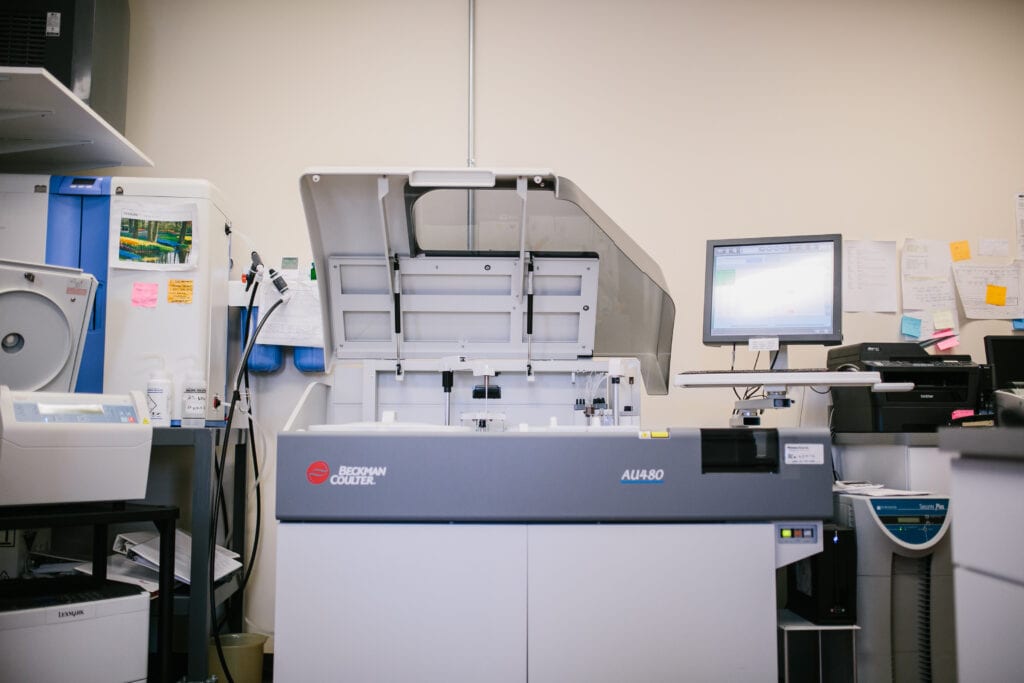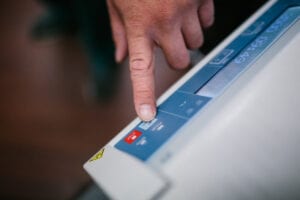Fluid Tests
 Cerebrospinal Fluid Tap
Cerebrospinal Fluid Tap
A cerebrospinal fluid tap (CSF tap) is performed by an Internal Medicine specialist, neurologist, radiologist or surgeon to evaluate the fluid that surrounds the brain. The procedure is done with your pet under general anesthesia after being fasted for 12 or more hours. Often CSF taps are done after a CT or MRI scan of the brain, while your pet is still under anesthesia. The tap itself only takes a few extra minutes.
Although a CSF tap is generally a low-risk procedure, there is a higher risk involved in cases of brain swelling due to a tumor or severe inflammation. Your doctor will tell you if the risks are higher for your pet because of a specific condition. The risk of anesthesia in patients with neurologic disease is always a consideration as well.
While anesthetized, a small patch of your pet’s hair is shaved at the top of the back, and a small needle is inserted into the area between the top of the spinal column and the back of the skull. The needle draws out some of the cerebrospinal fluid that surrounds the brain and spinal cord. In some cases, the fluid is drawn lower down on the spine; this procedure is called a lumbar puncture (LP).
The fluid is submitted to our pathology laboratory and results are generally available within one week. Sometimes medications are prescribed based on the initial impression of the CT or MRI scan, but may be changed when additional laboratory results become available in 4-7 business days. Some patients are able to go home the same day, but they typically stay overnight so they can be observed for the subsequent 12-24 hours.
Complete Blood Count
 A complete blood count (CBC) is a test to evaluate the cells that make up a patient’s blood. This includes red and white blood cells and platelets. A CBC is recommended as a part of every medical workup as it reveals critical information about your pet’s current health.
A complete blood count (CBC) is a test to evaluate the cells that make up a patient’s blood. This includes red and white blood cells and platelets. A CBC is recommended as a part of every medical workup as it reveals critical information about your pet’s current health.
If a patient has significant abnormalities on a CBC, the test may need to be repeated as necessary over 12-24 hours to evaluate response to therapy or change in medical status.
A CBC is performed after a small amount of blood is drawn from a vein or intravenous (IV) catheter. The blood is analyzed on an in-house automated counter for immediate results. If immediate results are not warranted or a more thorough review of cells is necessary, blood may be sent to our in-house board-certified clinical pathologist for review.
Serum chemistry profile
A serum chemistry profile (Vet test-GHP, chem, total health) is a test to evaluate the chemical components in your pet’s bloodstream. This includes screening for the evaluation of liver and pancreatic enzymes, kidney function, electrolytes and blood proteins. A serum chemistry profile is recommended as a part of every medical work-up as it reveals critical information about your pet’s current health.
If a patient has significant abnormalities on a serum chemistry profile, the test may need to be repeated as necessary over 6-12 hours to evaluate response to therapy or change in medical status.
A serum chemistry profile is done after a small amount of blood is drawn from a vein or intravenous (IV) catheter. The blood is evaluated on an in-house chemistry analyzer for immediate results. If immediate results are not warranted or a more thorough review of cells is necessary, blood may be sent to our in-house board certified clinical pathologist for review.
I-STAT
An I-STAT (I-stat CG4, CG6, or CG7) is a test to evaluate the electrolytes and acid base balance of your pet’s blood stream. It is done after a small amount of blood is drawn from a vein or intravenous (IV) catheter and then evaluated on an in-house analyzer for immediate results.
An I-STAT is recommended as a part of most medical work-ups as it reveals critical information about your pet’s current health. This test helps to determine what type of fluids are necessary for intravenous (IV) use in patients that are hospitalized or undergoing anesthesia. If a patient has significant abnormalities on an I-stat, the test may need to be repeated as necessary over 4-6 hours to evaluate response to therapy or change in medical status.
Coagulation tests
Coagulation tests (coag, PT, PTT, platelet count) are tests to evaluate your pet’s ability to form a normal blood clot. Coagulation tests may be recommended as a part of a medical work-up if your pet needs surgery, a non-surgical biopsy or if your pet has demonstrated a bleeding tendency.
Coagulation tests are done after a small amount of blood is drawn from a vein and the blood is evaluated on an in-house analyzer for immediate results.
Normal coagulation tests do not guarantee that your pet will not have a bleeding problem during a procedure. The tests are used to evaluate the risk of significant bleeding and may help determine the need for transfusions prior to, during or after a procedure.
